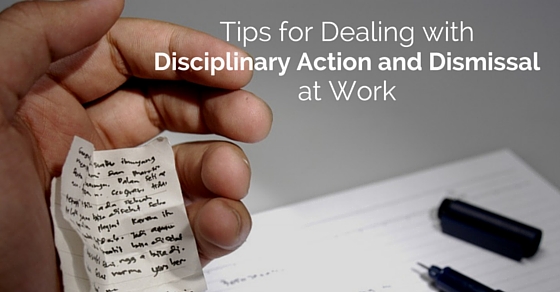An official working area is a place where an employer or employee comes to work on their assigned duties accordingly. Sometimes there will be some situations when a person reacts to certain matters in a different manner that may result against of their actions.
An employer taking a disciplinary action against the certain undisciplined behavior of one of the employees is very common in the professional lifestyle. This kind of disciplinary action is considered when there is the violation of official duties.

Why take disciplinary action? Reasons:
When an employer decides to take certain kinds of disciplinary action against certain violation of rules in office, he/she may consider providing reasons for his / her disciplinary actions. Here are those reasons for such disciplinary actions
1. Behavioral issues:
This can be a very common issue to take certain action against. There may be situations in the office when an employee behavior against his / her fellow workmates and other superior authority differs slightly.
Sometimes there may be a possibility of a difference between a team and it may turn in an ugly fight. At that point of time an employer can take some disciplinary action against those employees. If the behavioral issues continues of that particular employee then there may a possibility of dismissal of the work.
2. Absence:
An employer can take action against repetition of work absenteeism of an employee. An employer is a one who can take such call of action against any kind of rule break in the office. Being absent for a very long period of time and not responding with a certain valid reason for such absenteeism can cause a disciplinary action against an employee.
An employer can act according to the duties assigned to him/ her in which case he/she can notify an employee being absent during a period of time and then after that this kind of absenteeism continues, finally an employer can take a disciplinary procedure of dismissal from his / her work.
3. Work standard:
When an employee performance is not to the level of expectation, an employer can notify him/her about his / her mistakes in certain places. And even after that, an employee keeps lowering in his / her work delivery then this would turn things to a disciplinary level of action. An employer can take action over the employee’s poor performance in office and that disciplinary action can be treated as valid one.
Disciplinary and Grievance Procedure and Guidelines:
To follow a proper procedure of dismissal, an employer needs to know the employer rights and duties of dismissing that particular employee. There should be no room for a mistake while going through these dismissal procedures because any kind of mistake can turn things in the favor of the dismissing employees as they too have certain employee rights.
Below are certain disciplinary process and discipline procedures to follow during dismissal and disciplinary actions.
1. Sending a letter to relevant employee:
After making all the points about dismissing a particular employee from his / her duties, an employer needs to send a letter to the relevant employee stating all the details of the complaint filed against him/ her which is considered as a violation company rule.
By sending a dismissal letter stating all the reason for his / her dismissal can make things better for that particular employee and as well as for the employer.
2. Arranging a meeting with that particular employee:
After receiving the disciplinary letter from the employer stating all the complaints against one leading to a dismissal of his/her duties. An employer can arrange a meeting with that particular employee so that the reasons provided for his / her dismissal should be discussed clearly.
And needs to hear his / her side of the story before taking any kind of action employer against him/her. By following certain rules an employee at work that can be saved from certain monetary charges against him/ her.
3. Appealing a higher authority:
If an employee doesn’t agree with the allegation forced on him/her, one can always appeal a higher authority to look into his / her matter without any bias situations. An employee who is being dismissed of his / her duties rendered to the company can write an appeal letter to the higher authority to discuss the difference of allegation between an employer and the employee. By appealing for a chance to prove all the complaints against him/ her is null and void.
4. Inter – mediator:
When arguments between an employer and the employee doesn’t get resolved and they keep arguing about their stand on that dismissal matter, at that point of time those two people need to get a third party for communication so that there will be an end of the discussion with an unbiased and fair note. An inter-mediator should be fair enough for both of them. Bringing an intermediate between two people can help them come to a conclusion state.
5. Claiming a disagreement:
Even after a long discussion over dismissal matter, when an employee disagrees with the complaints charged against and refuse to accept the dismissal of his/ her duties, a better solution is to claim a disagreement between both the parties. By claiming a disagreement between both of the parties can make them come to a compromise state where they can negotiate their part of the story in certain terms accordingly to their favor.
6. Further help:
When things go out of the hands of both the employee and the employer, at that point of time an employee can seek further help from government agencies which provide solutions for such official differences. These further help can be considered as trade unions, employment committee or government agencies. These government agencies help the company and the employee to resolve their issue outside of the company.
Disciplinary Meetings or Hearings with Employees:
As discussed earlier, an employer should arrange for a meeting or in more official term considered, an employer should call for a disciplinary hearing between an employee and the employer. These meetings or hearings are arranged to discuss the disagreement of the employer’s decision. An employee can disagree an employer’s decision if he/she feels it is unfair to them. There are certain ways to appeal against the dismissal of an employment and they are as follows.
1. The way of disciplinary action taken:
While taking a disciplinary action at work against an employee, if an employer forgets to follow the company rules or policy, then the employee can question or challenge the way of charging disciplinary action against the complainant. An employer needs to keep in mind that before taking action against dismissal, he/she should take action according to the company disciplinary policy and there should not be any break of company policy.
2. Claim for a valid evidence:
An employee can demand a valid evidence of his / her dismissal. By demanding a valid evidence for his / her dismissal, an employee can turn things in their favor. If an employer fails to deliver a valid evidence for his / her decision of dismissal then the whole scene can turn into the opponents favor. An employer needs to hold a clear evidence of the accusing employee’s dismissal.
3. Claiming the evidence as null or void:
An employee can demand a valid evidence of his / her dismissal, and after demanding the evidence, an employee can deny it as void or null with certain proof. By demanding a valid evidence for his / her dismissal, an employee can turn things in their favor. If an employer fails to deliver a valid evidence for his / her decision of dismissal then the whole scene can turn into the opponents favor. An employer needs to hold a clear evidence of the accusing employee’s dismissal.
4. Bring up previous behavior of an employer:
After hearing all the detailed complaint against an employee imposed by the employer, the first thing to analyze the previous situation where an employer may have reacted in a different manner. An employee can bring up those situations with another employee’s where an employer has not taken action against them. The comparison of differences in behavior over certain employee’s by the employer can turn things in the favor of the employee.
5. Present evidence proving your side of the story:
An employee who has taken a hearing for his / her issue within the office needs to be prepared with the evidence proving oneself correct. By denying the proof presented by the employer as void or null, an employee earns a chance to present his / her side of evidence proving he/she is being framed or not guilty of the charges. This can be considered as the trump card of the hearing or meeting.
Common Disciplinary Mistakes made by Employers:
An employer needs to be very clear about the action he/she is taking against an employee. There are certain common mistakes of an employer which is considered as a wrong move towards disciplinary action and they are as follows.
1. By not warning an employee about the consequences of the disciplinary actions:
An employee always takes the warning of their employers very casually, as it won’t affect them in a negative manner. To make the employees work according to the company policy, an employer needs to explain all the employees the consequences of such disciplinary actions which can be taken against them, if any violation of company rules or damage of company property is done, by sending a warning letter to the employee.
2. By not explaining the employer the reason for his / her dismissal:
An employer needs to take a disciplinary action against a certain employee, who keeps breaking company policy. By taking such disciplinary dismissal of work, an employer makes it clear to the employees all the complaints against him/ her which are considered as a violation of company rules or regulations. By following this step, an employer will not accuse of being unfair towards accusing employee.
3. By taking disciplinary action without any valid evidence:
An employee can demand a valid evidence of his / her dismissal, and after demanding the evidence, an employee can deny it as void or null with certain proof. By demanding a valid evidence for his / her dismissal, an employee can turn things in their favor. If an employer fails to deliver a valid evidence for his / her decision of dismissal then the whole scene can turn into the opponents favor. An employer needs to hold a clear evidence of the accusing employee’s dismissal.
4. By not allowing the employee to be accompanied by another person:
According to the company rules and regulations, an employee can only accompany by those people who can be treated as a lawyer or government agency official who is taking a case against the company. A government official or a lawyer can be allowed to be accompanied by the accused employee. If an employer doesn’t allow such government official then there will be a break of company employment contract with that particular employee which stated in favor of his / her security.
Finally :
We would suggest that an employer before taking any disciplinary action against an employee needs to understand the reason for his/her constructive dismissal of work with valid proof or evidence. An employer never can be allowed to take disciplinary action of dismissal of work to satisfy his / her personal difference with another employee. There should always be a valid reason for a dismissal of the work. Therefore, all those employees who have been targets of dismissal of work in the name of disciplinary action, they can always take considering their reason of dismissal as a valid one. So to overcome such situations an employee can follow all above mentioned steps to deal with disciplinary action and dismissal of the work. This can help an employee to present their claim of dismissal as void or null.










































